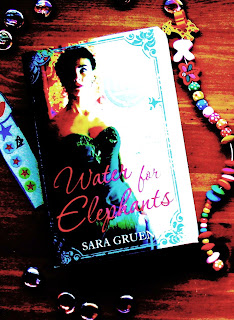'Water for Elephants', by Sara Gruen was just what I needed on a busy weekend in September. Once started, I couldn't leave it down for long; it demanded that I give it the attention it deserved. On a macro level this is a story about a young couple in love; a small clown; a drunken angel; an elephant; a monkey and a circus. There is no denying the allure of the big top. Gruen tantalises the senses with her descriptions of circus life in 1920's America. Her language is so evocative, that the pages wreak of peanuts and candyfloss. You loose yourself amidst the blurring of colours and the cacophonous din of the wild menagerie. The equally colourful characters, we are told at the back of the book, were often times based upon real people who lived the life of travelling circus entertainers. Their hitherto forgotten stories were happened upon by Gruen during her research. It is almost unthinkable that so much of this novel is non-fiction, yet who could ever consider that Rosie the elephant was a figment of someone's imagination; she is so vibrant and alive on the page.
But what this book actually left me with has nothing to do with jugglers and circus performers and is not half as exotic as we might wish. It made me consider how older people are treated by society. The book begins and ends with Jacob Jankowski, an elderly man, (of 90 or 93 years old; he can't remember which), who has been left in an old folks' home by his children to simply fade away. His treatment at the hands of busy, bossy, carers left me livid. To see this once vibrant, vital, man being treated so, was tragic. He is shown to be yet another victim of our disposable culture: along with throw away razors and milk-cartons, throw-away parents. It was not as if Jacob was suffering some horrendous illness; he was just an old widower, still with his full faculties, but suffering from terminal old age. In this, I find that Gruen's novel is somewhat reminiscent of Nicholas Sparks's The Notebook; it provokes the reader into reconsidering our understanding of the experiences of the older members of society. She makes us ponder what the future might hold in store for us, and it does not look good!
I haven't seen the movie of this book, so I cannot comment on it, but I do know that it is well worth reading, if only for the way it will make us pause and take notice of the senior people in our lives, for who knows what wonderful stories lie hidden beneath the surface, just waiting to be told.
